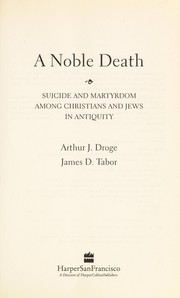Check nearby libraries
Buy this book

The right to die with dignity has emerged as a crucial issue in the 1990s. As reports of family- or doctor-assisted suicides increase, the issue of voluntary death is occupying an increasingly prominent place in our national consciousness. From theologians, medical ethicists, and talk-show hosts to people facing the issue in their own lives, all are participants in the debate, each seeking to influence and control the discourse on suicide and euthanasia. Now, this.
Pathbreaking study provides a stunning reappraisal of the early history of this controversial human freedom. A Noble Death challenges the often unquestioning attitudes we have toward suicide and traces the evolution of these attitudes from the time of Socrates to the present day. Droge and Tabor reveal the extraordinary fact that early Christians and Jews did not absolutely condemn suicide, but instead focused on whether or not it was committed for noble reasons. In.
Fascinating detail, the texts and traditions presented here--from Greek and Roman philosophy, to Judaism, Christianity, and the Bible itself--make clear that the decision to take one's life, or allow it to be taken, was not considered a sin but a noble choice, provided there was sufficient justification for the act. "The Bible nowhere proscribes suicide," the authors write. "In fact, there are at least seven individuals in the Bible who take their own lives, and none of.
Them is condemned for the act ... Many [have] a vague notion that the so-called Judeo-Christian tradition speaks decisively against the act of suicide, but just what that objection is, when it developed, and what came before it, are mostly not known." From Socrates' insistence on the requirement of a divine sign to Seneca's emphasis on the unqualified freedom of the individual to Augustine's attempt to restrict that freedom, A Noble Death illustrates how strongly we.
Share these early attitudes toward voluntary death. But the very attempt to find a consensus indicates how the decision to die could--and can--be a conscientious one. Intensely relevant to the contemporary debate, A Noble Death takes the reader on a challenging and instructive journey to the surprising origins of Western culture's thoughts on voluntary death.
Check nearby libraries
Buy this book

Previews available in: English
Subjects
Christianity, History, Judaism, Martyrdom, Moral and ethical aspects of Suicide, Religious aspects of Suicide, Social history, Suicide, Suicide -- Moral and ethical aspects -- History., Moral and ethical aspects, Christendom, Martyrium, Jodendom, Judentum, Zelfmoord, Selbstmord, Oudheid, Frühchristentum, Religious aspectsPlaces
Mediterranean RegionTimes
To 500| Edition | Availability |
|---|---|
|
1
A noble death: suicide and martyrdom among Christians and Jews in antiquity
1992, HarperSanFrancisco
in English
- 1st ed.
0060620951 9780060620950
|
aaaa
|
|
2
A Noble Death: Suicide and Martyrdom Among Christians and Jews in Antiquity
November 1991, HarperSanFrancisco
in English
0060620951 9780060620950
|
zzzz
|
|
3
A Noble Death: Suicide and Martyrdom Among Christians and Jews in Antiquity
November 1991, HarperSanFrancisco
Hardcover
in English
- 1st ed edition
0060620951 9780060620950
|
zzzz
|
Book Details
Edition Notes
Includes bibliographical references (p. [191]-197) and index.
Classifications
The Physical Object
Edition Identifiers
Work Identifiers
Community Reviews (0)
| April 1, 2025 | Edited by MARC Bot | import existing book |
| December 13, 2019 | Edited by MARC Bot | import existing book |
| July 30, 2019 | Edited by MARC Bot | associate edition with work OL4127805W |
| January 11, 2019 | Edited by MARC Bot | import existing book |
| December 10, 2009 | Created by WorkBot | add works page |









